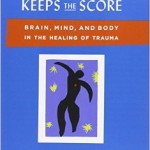Polyvagal Theory Explained
by: Stephen Porges, PhD
What Happens When the Fight/Flight Response Fails
Consider this short example.
On CNN they showed an airplane having great difficulty landing. The wings were tipping back and forth and the outcome was uncertain.
After it landed, a reporter interviewed the passengers, going up to one woman and asking, “How did you feel?” The expectation was that the woman would say, “I was really scared. I was ready to jump out of my skin.” But her comment wasn’t that.
She said, “Feel? I passed out.”
Now, was the woman’s passing out a voluntary escape? No, her nervous system detected features of risk.
You see, our neuroception – our nervous system’s evaluation of risk – is functionally unpredictable (and it happens without our awareness). We don’t know how our nervous system will respond.
If that plane hit the ground and went up into flames, her transition from life to death would have been without pain. However, many of the people in exactly the same environment were screaming, while there were probably others who were relatively calm.
So here we have an example of the same scary event being translated by different nervous systems in different ways.
Why Does the Response of the Nervous System Matter?
Well first, let’s back up and review the development of the vagus nerve.
Early in vertebrate evolution, neural regulation of the heart was mediated by an unmyelinated, less-than-efficient vagus. This neural system provided an ability to defend by immobilizing, which meant reducing metabolic demands, reducing oxygen demands, reducing food demands, and surviving.
As mammals evolved, something special happened to the vagus. The evolved vagus was able to dampen the sympathetic nervous system and the adrenal circuits to enable mammals to engage socially, and to optimize metabolic resources.
This is one of the main points of the Polyvagal Theory – when we are social and engaged, we’re reducing metabolic demands in order to facilitate health, growth, and restoration.
What Happens to the Nervous System When a Person Has Trauma?
If you are confronted with a challenge:
The first part of your nervous system will try to negotiate by using the face, using vocalization, using language.
If that doesn’t work, there’s going to be a retraction of the new social engagement system to promote mobilization.
If that doesn’t work, then you’re really going to gear up the sympathetic nervous system for fight-flight.
But if you can’t escape, and you can’t fight, increasing sympathetic nervous system activity is not adaptive since mobilizing will not be an effective defense.
Under these circumstances the nervous system seems to evaluate the risk of threat and will trigger a shutdown response. This is similar to the scenarios described by people with trauma histories, especially small children, or people confronted by larger and stronger people, or experiences in an environment where someone has a weapon.
The problem is that when we start dealing with trauma, the clinical world is obsessed with the event and not with understanding that a person’s response to the event is the critical feature.
Here’s What’s Important . . .
If people go into a state of immobilization with fear, the nervous system doesn’t provide them with an easy way to get out, meaning getting back to a normal system where social engagement processes are easily recruited.
For most people, the trauma experience results in the development of a complex narrative of why they don’t want to socially interact: they don’t trust people…basically they have visceral physiological feelings.
They’re exhausted, their nervous system is detecting risk when there is no real risk, and they are trying to negotiate this very complex world. The narrative they’re building is an attempt to support the physiological experience.”



